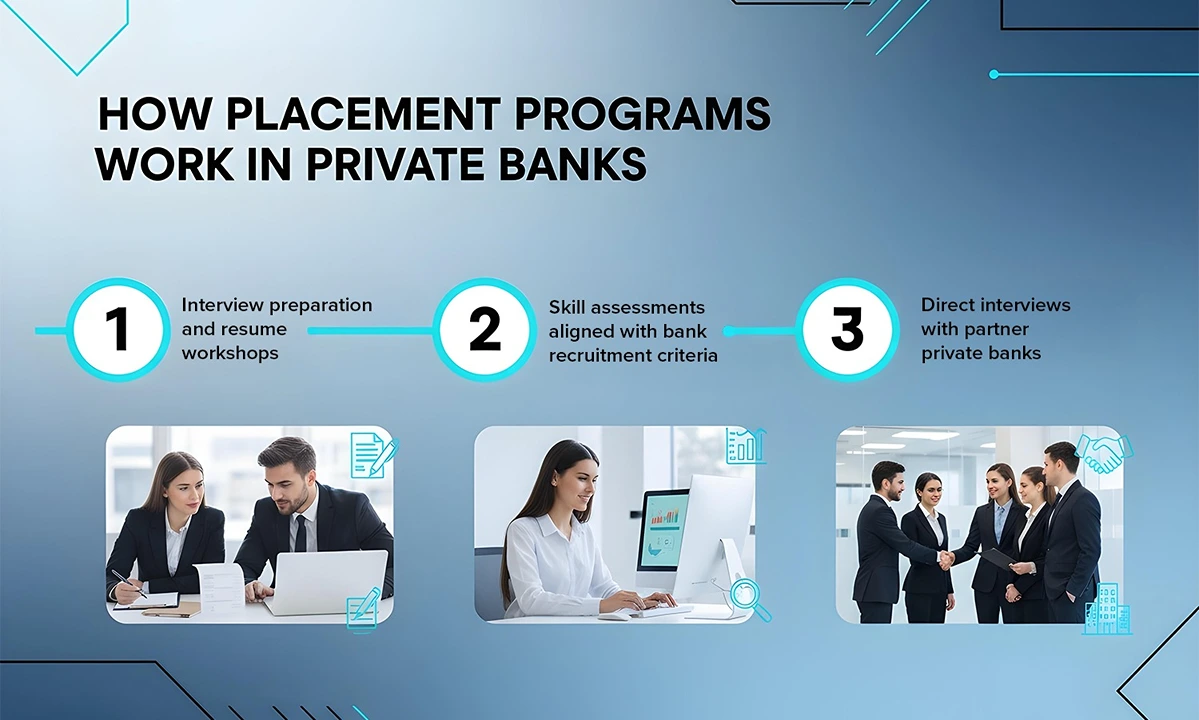Key Takeaways
- A bank training and placement program bridges the gap between academic learning and real-world banking careers.
- Specialized banking courses after graduation prepare you with the technical and soft skills private banks look for.
- With placement-focused training like SRM School of Banking, you can fast-track your entry into leading private banks.
Why Bank Training is Essential for Private Bank Jobs
Getting a job in a private bank today requires more than just a degree—it demands professional readiness. Most graduates, despite strong academic backgrounds, lack the hands-on exposure needed to meet private bank standards. That’s where bank training and placement programs step in.
These courses simulate real banking environments, covering everything from customer handling and financial documentation to digital banking platforms. They also focus on communication skills, sales techniques, and compliance knowledge, all crucial for private bank roles. In short, training helps you move from theoretical learning to industry-ready performance, increasing your chances of placement success bank training and placement.
Types of Bank Training and Placement Programs in India
In India, there are various types of bank training and placement programs such as certification courses, PGDBF programs, in-house bank training, and private job-oriented programs. These programs prepare candidates for roles in retail banking, customer service, sales, and operations. While some offer certifications, others focus on direct job placements with banks and NBFCs. SRM School of Banking (SRMSB) stands out by providing practical banking training with assured placement, without any certification requirements. .
Top institutions also provide bank job training and placement assistance through tie-ups with private banks like HDFC, ICICI, and Axis. These programs include mock interviews, aptitude tests, and real-time projects that simulate the day-to-day operations of a modern private bank.
Skills You Gain from Bank Training and Placement

A quality banking course builds both technical and interpersonal skills vital for success in private banks. Students typically gain:
- Banking operations knowledge – from KYC norms to financial transactions
- Sales and relationship management skills – to handle client portfolios
- Digital banking and software training – exposure to CRM and core banking systems
- Soft skills development – communication, etiquette, teamwork, and professionalism These abilities make candidates job-ready and capable of performing effectively from day one.
How Placement Programs Work in Private Banks

The placement assured course model connects candidates directly to private bank recruiters through structured placement drives. These programs often include:
- Interview preparation and resume workshops
- Skill assessments aligned with bank recruitment criteria
- Direct interviews with partner private banks
Candidates who clear evaluations are placed into roles such as customer relationship executive, credit analyst, or branch operations associate. The focus remains on ensuring every trainee secures a relevant, growth-oriented role in the BFSI sector.
How SRM School of Banking Helps You Land a Private Bank Job
At SRM School of Banking, students receive more than just academic instruction—they gain a real career pathway. The school’s placement assured course
offers:
- Industry-curated modules designed by banking professionals
- Live project experience through simulated banking tasks
- Dedicated placement assistance with top private banks
- Personalized mentorship to help students perform confidently in interviews
With SRM’s structured approach, graduates transition smoothly into rewarding private bank careers, fully equipped with the skills and confidence employers
Enroll now and kickstart your assured banking career with SRM School of Banking!
FAQs
Yes, professional training gives you the practical knowledge and soft skills that private banks prioritize during recruitment.
Most bank training and placement programs last between 3 to 6 months, depending on course depth and specialization.
Private banks like HDFC, ICICI, Axis, Kotak Mahindra, and IDFC First Bank actively recruit trained candidates from certified institutes.
Freshers can expect a starting salary between ₹3–5 LPA, with growth potential depending on performance and role type.


